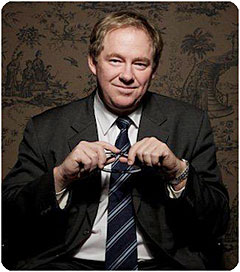FEATURE ARTICLE -
From the President, Issue 58: Dec 2012
It is a privilege to present my Annual Report for 2011-2012.
The true professions, the law, medicine, the military and the clergy,
are unique because a t the heart of their development lay an implicit agreement with the community that they served. The community granted the right exclusively to practice and the privilege of self-regulation. In return the professions through self regulation agreed to maintain professional and ethical standards and, where it was required, to act and speak in the public interest.
t the heart of their development lay an implicit agreement with the community that they served. The community granted the right exclusively to practice and the privilege of self-regulation. In return the professions through self regulation agreed to maintain professional and ethical standards and, where it was required, to act and speak in the public interest.
The profession of the law has of course evolved. One important role for a professional Association will always be to represent the interests of its members. However, the touchstones of a true profession remain, may I suggest, an acute interest in the professional and ethical standards of all who practice; the provision in the public interest of services which permit our community to access our justice system; and a willingness to act in the public interest.
In all of these respects it has been a busy year for the Association. As to matters of public interest, the Bar is (I am pleased to say) frequently consulted by the government on issues of law reform and on draft legislation. Often, because of the sensitivity of draft proposals, consultation occurs on a confidential basis. I do wish to take this opportunity to thank those members of the Association who have contributed through our sub-committees to this important work. A list of some of the matters dealt with can be found elsewhere in the Annual Report.
I would add that in wider community interest, the Bar continues to provide pro-bono services to needy litigants. I am also pleased to report that the Bar has established the South Pacific Region Education Committee, the work of which consists of matters relating to the preparation and conduct of advocacy skills and legal training workshops for the National Lawyers of Papua New Guinea and for the trainees of the Legal Training Institute of Papua New Guinea. The Committee has met with representatives of the Legal Training Institute and we expect advocacy courses to commence next year.
Our professional development programme has strengthened over the years. Training in legal ethics forms an important part of our programme. The new Bar Association offices, which were officially opened by The Honourable Paul de Jersey AC, Chief Justice of Queensland on 7 October 2011, provide a dedicated teaching area for the provision of our CPD programme and more user friendly meeting spaces for our committees.
In the context of initiatives relating to member services, it is important to understand the dynamic context in which the profession performs its work. While we must be vigilant in retaining those practices and values which have served us so well to date, we must be mindful that continued success depends upon the ability of the profession to adapt and innovate.
It is critical that we be prepared, as a professional body, to promote the Bar as a provider of high quality, specialist services. We need to do so not only in the direction of those from whom traditionally we have obtained work, but also by more immediate promotion in the direction of professional groups and commercial associations likely to be our clients. There is every reason why, for example, the very significant intellectual resources of the Bar should be promoted through a “CPD” programme directed not only to our members but also company directors and industry groups, and the Council is considering means by which they can be achieved.
The Council is of the firm view that the criminal justice system is best assisted by the continuance of a strong, highly skilled independent bar, the specialist advocacy skills of which best promote the interests of justice. There is little doubt that over the past few years the amount of work coming to the criminal bar has decreased. There are a number of reasons for this including the Moynihan reforms; more work being done by solicitor advocates; and the Director of Public Prosecutions seldom briefing out, which has been driven in large measure, by cost constraints, a circumstance that is unlikely to change in the short term. These are matters of which the Council is acutely aware and we are exploring options to address it.
While there remains a responsibility on government adequately to fund legal aid, we need to think more broadly about long term options to permit members of the community to litigate where alternative means of resolving disputes have failed. On 21 May 2012 the Bar Council approved a proposal to investigate and if worthwhile prosecute the case for capped contingency fees in litigation. By “capped”, what is contemplated is a reasonable statutory limit on the contingency fee. There is a legitimate public interest in investigating the proposal. While speculative fees with a statutory uplift are charged already, they tend to be charged where the element of risk in the litigation is least. Access to justice in some areas is more readily found than in others. Moreover, litigation funders already charge on a contingency basis. Litigation funding permits better access to justice for the community and contingency fees, providing there are adequate safeguards, a sensible and alternative means of permitting the community to access the courts. The President of the Queensland Law Society and I raised the issue at the Law Council of Australia Conference on 16 June 2012. The proposal received broad support and is now the subject of a working group within the Law Council of Australia.
The Council has established a working group to further the Queensland Bar’s interests in professional opportunities in Singapore. In terms of international arbitrations, Singapore is seen by many Asian corporations and investors as a secure and stable jurisdiction to litigate. The recognition of Singapore as an international centre for arbitration is supported by the interest shown by London Chambers, in particular, 20 Essex Street and Essex Court Chambers which have both established a significant foothold in Singapore to take advantage of work in Singapore but also matters coming into Singapore from India and Malaysia.
I should record that to mark the Sesquicentenary of the Supreme Court of Queensland, the Association presented on 14 December 2011, a Ceremonial Staff designed and manufactured by David Boucher an internationally recognised master craftsman. As I noted in my speech to the Court, the Ceremonial Staff as a gift of the Bar Association of Queensland to the Court, marked not only the sesquicentenary of the Court but importantly recognises the depth of respect and affection that the Bar holds for the Court and the unique relationship between Bench and Bar which has endured for 150 years. The Staff is now displayed in the new Sir Harry Gibbs Legal Heritage Centre in the Queen Elizabeth II Courts of Law, from where it is retrieved for use on ceremonial occasions.
It is pleasing to note that notwithstanding the costs associated with the redevelopment of the ground floor of the Inns of Court, the Association’s financial position remains strong and the budget for 2012/2013 is designed to further consolidate that position. As is apparent from the report of the Honorary Treasurer, the Association has ended the year on a very positive note. Our strong financial position will allow us to plan for the future with confidence.
I would like to acknowledge and thank Jim Murdoch S.C. the Chairman and Board of the Association’s commercial arm, Barristers Services Pty Limited for their on-going work on behalf of the members of the Association.
The Association’s electronic “Hearsay” magazine continues to go from strength-to-strength with high readership levels and provides an excellent vehicle for keeping members informed of current and topical areas of interest. I thank the editor Geoff Diehm S.C. and his committee for their efforts. The magazine is now accessible to solicitors in the QLS weekly newsletter, thereby showcasing our member’s industry and endeavours. I thank members for their contribution.
The Association has enjoyed a productive, constructive and cordial relationship with the Attorney-General, The Hon. Jarrod Bleijie MP , and his senior departmental officers. I record our appreciation to him, to the former Director-General, Mr Philip Reed, as well as the officers in the Justice Department, for their readiness to listen to the Association’s views on a range of topics and to co-operate with us in furthering the interests of the administration of justice in this State.
I express my thanks to our loyal staff in the Association office, the Vice President Mr Peter Davis S.C., the members of the Bar Council, the directors of Barristers Services Pty Limited, and the many other members of the Association and the judiciary who have given so much of their time and expertise in supporting and promoting the affairs of the Queensland Bar.
Finally, I wish to congratulate (now) Deputy President O’Connor on his appointment to the Industrial Relations Commission and thank him for his service to the Bar Association. His Honour was appointed Deputy President after years of distinguished service to the community, to the Bar and to the legal profession. He has long been a citizen in the true sense. His Honour held the position of Chief Executive of the Bar Association for 18 years. He was often the public face of our professional Association, representing our members in the company of the judiciary and interstate, national and international professional bodies. In doing so he was always dependable, discreet, sensitive to his surrounds and demonstrated sound judgment. I thank His Honour Deputy President O’Connor on behalf of our members for his service to the Bar and wish him well for the future.
Roger N Traves S.C.
President




 t the heart of their development lay an implicit agreement with the community that they served. The community granted the right exclusively to practice and the privilege of self-regulation. In return the professions through self regulation agreed to maintain professional and ethical standards and, where it was required, to act and speak in the public interest.
t the heart of their development lay an implicit agreement with the community that they served. The community granted the right exclusively to practice and the privilege of self-regulation. In return the professions through self regulation agreed to maintain professional and ethical standards and, where it was required, to act and speak in the public interest.